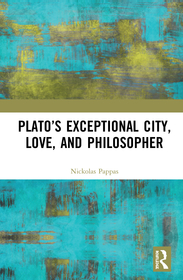
Plato’s Exceptional City, Love, and Philosopher
-
20% KEDVEZMÉNY?
- A kedvezmény csak az 'Értesítés a kedvenc témákról' hírlevelünk címzettjeinek rendeléseire érvényes.
- Kiadói listaár GBP 145.00
-
69 273 Ft (65 975 Ft + 5% áfa)
Az ár azért becsült, mert a rendelés pillanatában nem lehet pontosan tudni, hogy a beérkezéskor milyen lesz a forint árfolyama az adott termék eredeti devizájához képest. Ha a forint romlana, kissé többet, ha javulna, kissé kevesebbet kell majd fizetnie.
- Kedvezmény(ek) 20% (cc. 13 855 Ft off)
- Kedvezményes ár 55 419 Ft (52 780 Ft + 5% áfa)
Iratkozzon fel most és részesüljön kedvezőbb árainkból!
Feliratkozom
69 273 Ft

Beszerezhetőség
Becsült beszerzési idő: A Prosperónál jelenleg nincsen raktáron, de a kiadónál igen. Beszerzés kb. 3-5 hét..
A Prosperónál jelenleg nincsen raktáron.
Why don't you give exact delivery time?
A beszerzés időigényét az eddigi tapasztalatokra alapozva adjuk meg. Azért becsült, mert a terméket külföldről hozzuk be, így a kiadó kiszolgálásának pillanatnyi gyorsaságától is függ. A megadottnál gyorsabb és lassabb szállítás is elképzelhető, de mindent megteszünk, hogy Ön a lehető leghamarabb jusson hozzá a termékhez.
A termék adatai:
- Kiadás sorszáma 1
- Kiadó Routledge
- Megjelenés dátuma 2020. július 28.
- ISBN 9780367424473
- Kötéstípus Keménykötés
- Terjedelem302 oldal
- Méret 234x156 mm
- Súly 453 g
- Nyelv angol 82
Kategóriák
Rövid leírás:
This book reconnoiters the appearances of the exceptional in Plato: as erotic desire (in the Symposium and Phaedrus), as the good city (Republic), and as the philosopher (Ion, Theaetetus, Sophist, Statesman). It offers fresh and sometimes radical interpretations of these dialogues.
TöbbHosszú leírás:
This book reconnoiters the appearances of the exceptional in Plato: as erotic desire (in the Symposium and Phaedrus), as the good city (Republic), and as the philosopher (Ion, Theaetetus, Sophist, Statesman). It offers fresh and sometimes radical interpretations of these dialogues.
Those exceptional elements of experience – love, city, philosopher – do not escape embodiment but rather occupy the same world that contains lamentable versions of each. Thus Pappas is depicting the philosophical ambition to intensify the concepts and experiences one normally thinks with. His investigations point beyond the fates of these particular exceptions to broader conclusions about Plato’s world.
Plato’s Exceptional City, Love, and Philosopher will be of interest to any readers of Plato, and of ancient philosophy more broadly.
TöbbTartalomjegyzék:
Epigraph and Note; Introduction; Part I: Why love must be good: kinds of erôs in Plato’s Symposium and Phaedrus; 1. Congenital love: Aristophanic erôs in the Symposium; 2. Telling good love from bad: Erôs in the Phaedrus; Part II: How a city is made better: the polis in Plato’s Republic; 3. Speaking of tyrants: Gyges and the Republic’s city; 4. The news of the new city; 5. "And then I saw": the myth of Er and the future city; Part III: Where to find the best philosophers: the philosophos in Plato’s Theaetetus , Sophist , and Statesman; 6. "You wise people": the Ion on what sets a philosopher apart; 7. Philosophers at last: Theaetetus, Socrates, and the head philosopher; 8. The Sophist: the sophist with and without philosophy; 9. The Statesman: the little difference that makes philosophy
Több



